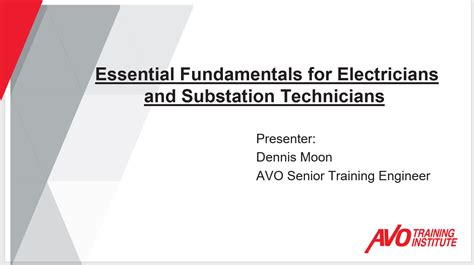As the demand for electricity continues to grow, so does the need for skilled substation technicians. These technicians play a crucial role in ensuring the safe and efficient transmission of electrical power to homes, businesses, and industries. To excel in this field, substation technicians must possess a unique combination of technical knowledge, hands-on skills, and physical abilities. In this article, we will explore the 7 essential skills required to become a successful substation technician.

1. Electrical Theory and Fundamentals
A strong understanding of electrical theory and fundamentals is the foundation of a substation technician's skillset. This includes knowledge of electrical circuits, voltage, current, resistance, and power. Substation technicians must be able to apply these principles to troubleshoot and repair electrical equipment, as well as ensure safe and efficient operation of the substation.
Some key areas of focus in electrical theory and fundamentals include:
- Circuit analysis and calculation
- Voltage and current measurement
- Electrical safety procedures
- Transformer theory and application
- Relay protection and control
Substation Technician Electrical Theory Fundamentals
- Familiarity with electrical codes and standards (e.g., NEC, IEEE)
- Understanding of electrical testing and measurement techniques
- Ability to read and interpret electrical diagrams and schematics
2. Hands-on Troubleshooting and Repair
Substation technicians must be skilled in hands-on troubleshooting and repair of electrical equipment, including transformers, circuit breakers, and relays. This requires a strong understanding of electrical systems, as well as the ability to use specialized tools and testing equipment.
Some key areas of focus in hands-on troubleshooting and repair include:
- Troubleshooting techniques and methodologies
- Use of testing equipment (e.g., multimeters, oscilloscopes)
- Repair and maintenance of electrical equipment
- Replacement of faulty components and parts

3. Safety Procedures and Protocols
Substation technicians work in a hazardous environment, and safety is a top priority. Technicians must be familiar with safety procedures and protocols, including lockout/tagout, personal protective equipment (PPE), and emergency response procedures.
Some key areas of focus in safety procedures and protocols include:
- Lockout/tagout procedures
- PPE selection and use
- Hazard recognition and mitigation
- Emergency response planning and training
Substation Technician Safety Procedures Protocols
- Familiarity with OSHA regulations and guidelines
- Understanding of electrical safety codes and standards (e.g., NFPA 70E)
- Ability to conduct safety inspections and audits
4. Physical Ability and Stamina
Substation technicians must be physically fit and able to work in a variety of environments, including extreme temperatures, heights, and confined spaces. Technicians must also be able to lift and carry heavy equipment and tools.
Some key areas of focus in physical ability and stamina include:
- Physical fitness and endurance
- Ability to work at heights and in confined spaces
- Lifting and carrying heavy equipment and tools
- Working in extreme temperatures and weather conditions

5. Communication and Teamwork
Substation technicians often work as part of a team, and effective communication and teamwork skills are essential. Technicians must be able to communicate complex technical information to colleagues, supervisors, and customers.
Some key areas of focus in communication and teamwork include:
- Verbal and written communication skills
- Ability to work collaboratively with others
- Conflict resolution and negotiation skills
- Customer service and relations
Substation Technician Communication Teamwork
- Familiarity with project management principles and methodologies
- Understanding of quality control and assurance procedures
- Ability to conduct training and mentoring sessions
6. Continuous Learning and Professional Development
The field of substation technology is constantly evolving, and technicians must be committed to ongoing learning and professional development. This includes staying up-to-date with new technologies, techniques, and industry developments.
Some key areas of focus in continuous learning and professional development include:
- Staying current with industry developments and trends
- Participating in training and professional development programs
- Attending conferences and workshops
- Reading industry publications and technical journals

7. Analytical and Problem-Solving Skills
Substation technicians must be able to analyze complex technical problems and develop effective solutions. This requires a strong analytical mindset, as well as the ability to think critically and creatively.
Some key areas of focus in analytical and problem-solving skills include:
- Analytical and critical thinking skills
- Ability to identify and prioritize problems
- Development of effective solutions and troubleshooting strategies
- Implementation and testing of solutions
Substation Technician Analytical Problem-Solving Skills
- Familiarity with root cause analysis and failure modes and effects analysis (FMEA)
- Understanding of statistical process control and quality control methodologies
- Ability to conduct cost-benefit analysis and return on investment (ROI) studies






By possessing these 7 essential skills, substation technicians can excel in their roles and contribute to the safe and efficient transmission of electrical power. Whether you're just starting your career or looking to advance in the field, developing these skills will help you succeed as a substation technician.
We encourage you to share your thoughts and experiences in the comments section below. What skills do you think are most essential for substation technicians? Have you encountered any challenges in your own career as a substation technician? Share your insights and help us continue the conversation!
What is the typical salary range for substation technicians?
+The typical salary range for substation technicians varies depending on factors such as location, experience, and industry. However, according to the Bureau of Labor Statistics, the median annual salary for electrical technicians was $65,320 in May 2020.
What kind of training or education is required to become a substation technician?
+To become a substation technician, you typically need to complete a training program or earn an associate's degree in electrical technology or a related field. Many community colleges and technical schools offer programs in electrical technology, and some employers may also provide on-the-job training.
What are some common safety hazards faced by substation technicians?
+Substation technicians may face a variety of safety hazards, including electrical shock, arc flash, and falls from heights. It's essential for technicians to follow proper safety procedures and use personal protective equipment (PPE) to minimize the risk of injury.
